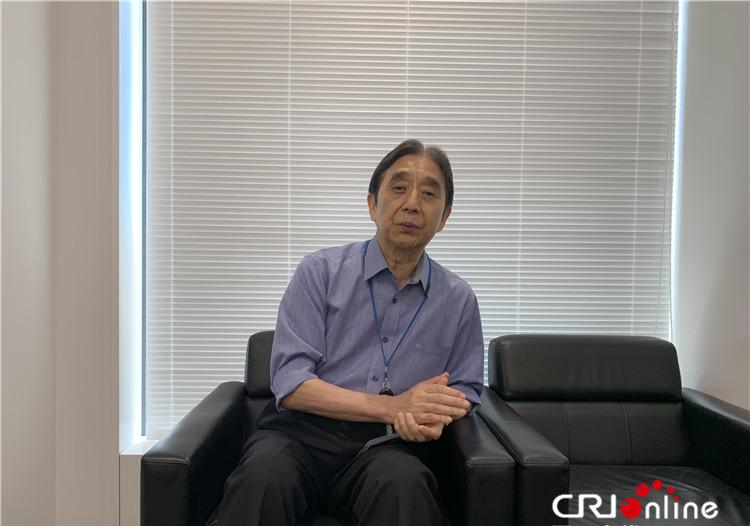
Saienji Ichihō was interviewed by reporters
International Online Report (Reporter Zhou Li): This year marks the 70th anniversary of the founding of New China. Over the past 70 years, countless foreign politicians, scholars, business people and ordinary people have witnessed China's development and progress, and contributed their own strength to promoting their own friendship with China. Mr. Ichihō Saienji, a 77-year-old consultant to the Japan-China Friendship Association and a visiting professor at Higashi-Nichiren International University, has forged an indissoluble relationship with China more than 60 years ago and has been committed to the cause of Japan-China friendship for many years. In a recent interview with reporters, he once again recalled the great work and immortal contributions made by Premier Zhou Enlai to develop Sino-Japanese relations before his death, and repeatedly stressed that China and Japan "combine to benefit both sides, and fight to lose both."
Saienji Ichiichi was a famous japanese monk, and his father, Saienji Koichi, actively campaigned for the cause of friendly exchanges between the two countries long before the normalization of Sino-Japanese diplomatic relations, and was praised by Premier Zhou Enlai as a "non-governmental ambassador." In this way, Mr. Ichihō is the second generation of "folk ambassadors" of the Saienji family, and belongs to the "senior Chinese old friends".
During his visit to China in 1971, he was with Premier Zhou at the Great Hall of the People
Saienji told reporters that in 1956, Japan and the Soviet Union normalized diplomatic relations. At that time, there were voices in Japan expecting to normalize diplomatic relations with China as soon as possible. Premier Zhou Enlai seized this opportunity with a keen political vision and hoped to invite a Japanese person who aspired to normalize Sino-Japanese diplomatic relations and had many friends from all walks of life and had no selfish intentions to come to China to make preparations. It was in this context that in January 1958, Xiyuan Temple Gongyi and his family came to Beijing via Hong Kong. Soon, Premier Zhou and his wife met with the Xiyuan Temple family at the Xihua Hall in Zhongnanhai and ate together. Xiyuan Temple has not forgotten Premier Zhou's advice to him.
Xiyuan temple said: "At that time, Premier Zhou said two words to those who were still in the third year of junior high school, one is that in the future, you will live in Beijing for a long time, and you must make more friends, and these friends will become your personal precious wealth, and at the same time, they will become the precious wealth of Japan and China; the other sentence is that in the future, you will see and hear all kinds of people or things when you live in Beijing. China is a developing country, there are good places, there are also bad places, if you find shortcomings, deficiencies, mistakes, do not be polite, directly tell your friends, teachers or principals, can be critical opinions. If they don't listen, you tell me directly. We can't just listen to good words, but we need friends who can give their opinions frankly. As a child at the time, I didn't quite understand, but when I look back, I understood the deep meaning of Premier Zhou's words. ”
In the 1960s, he was with Premier Zhou and his wife, Mr. Liao Chengzhi, Zhao Anbo, etc
Mr. Saienji recalled that before the normalization of diplomatic relations, Sino-Japanese relations experienced various twists and turns due to changes in the domestic situation. Especially after the "Nagasaki Flag Incident" in 1958, Sino-Japanese relations seriously regressed, and bilateral trade relations were also interrupted. "Against that backdrop, Premier Zhou decided to make a big adjustment to China's policy toward Japan," he said. Previously, it had been hoped to normalize Sino-Japanese diplomatic relations through communication at the government level, but due to the rise of the Kishi Nobusuke regime, it was impossible to achieve this goal in the short term. ”
Through the continuous efforts of people in various fields on both sides, in the end, the good people-to-people environment successfully prompted the leaders of the two countries to make strategic decisions and normalized Sino-Japanese diplomatic relations.
In the 1970s, as the head of the Japan-China Friendship Youth Delegation, he was cordially received by Vice Premier Xi Zhongxun during his visit to China
In the ten years of living in China, Xiyuan Temple followed Premier Zhou's advice, made friends, and completed middle school and university with excellent results. After returning to Japan, Saienji followed his father's advice and after a travel expedition to Japan and other parts of the world, joined the Asahi Shimbun, focusing on research on China and Northeast Asia. At the same time, he actively promoted people-to-people exchanges between Japan and China, and served as the dean of the Confucius Institute at Nihon Institute of Technology University. Xiyuan Temple believes that After 70 years of ups and downs, China will eventually rise, and it will rise peacefully.
Mr. Saienji said: "In the future, China may experience various twists and turns, but it will continue to develop. President Xi Jinping proposed in the 'Belt and Road' concept that it is necessary to build a community with a shared future for mankind and achieve win-win sharing among all countries. In other words, China's rise is a peaceful rise. I believe that China will follow the path of peaceful rise that will never seek hegemony. ”
Group photo with Vice President Zhou Peiyuan at Peking University in the 1960s
Regarding the future Sino-Japanese relations, Mr. Saienji said that the key to maintaining peace in Asia is to do a good job in Japan-China relations. Borrowing from Premier Zhou's words, he repeatedly stressed that "unity benefits both sides, and fighting loses both." He believes that at present, the two countries are facing a good opportunity to improve their relations, and in the future, the two sides should further promote people-to-people exchanges, including youth exchanges, and continuously consolidate the public opinion foundation for Japan-China friendship.